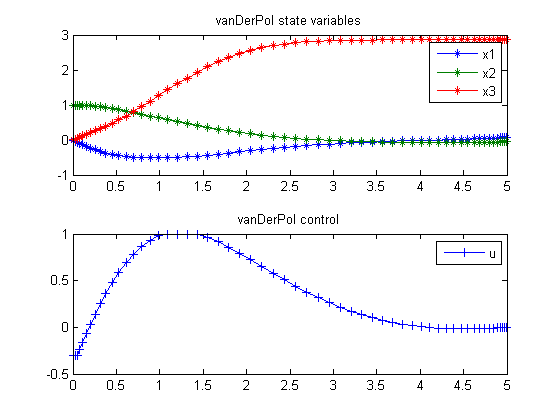Van der Pol Oscillator
Restricted second order information for the solution of optimal control problems using control vector parameterization. 2002, Eva Balsa Canto, Julio R. Banga, Antonio A. Alonso Vassilios S. Vassiliadis
Case Study 6.1: van der Pol oscillator
This case study has been studied by several authors, for example Morison, Gritsis, Vassiliadis and Tanartkit and Biegler.
Contents
Problem Description
The dynamic optimization problem is to minimize:

subject to:




![$$ x(t_0) = [0 \ 1 \ 0]' $$](xvanDerPol_eq58749.png)

% Copyright (c) 2007-2008 by Tomlab Optimization Inc.
Problem setup
toms t p = tomPhase('p', t, 0, 5, 60); setPhase(p); tomStates x1 x2 x3 tomControls u % Initial guess x0 = {icollocate({x1 == 0; x2 == 1; x3 == 0}) collocate(u == -0.01)}; % Box constraints cbox = {-10 <= icollocate(x1) <= 10 -10 <= icollocate(x2) <= 10 -10 <= icollocate(x3) <= 10 -0.3 <= collocate(u) <= 1}; % Boundary constraints cbnd = initial({x1 == 0; x2 == 1; x3 == 0}); % ODEs and path constraints ceq = collocate({dot(x1) == (1-x2.^2).*x1-x2+u dot(x2) == x1; dot(x3) == x1.^2+x2.^2+u.^2}); % Objective objective = final(x3);
Solve the problem
options = struct;
options.name = 'Van Der Pol';
solution = ezsolve(objective, {cbox, cbnd, ceq}, x0, options);
t = subs(collocate(t),solution);
x1 = subs(collocate(x1),solution);
x2 = subs(collocate(x2),solution);
x3 = subs(collocate(x3),solution);
u = subs(collocate(u),solution);
Problem type appears to be: lpcon
===== * * * =================================================================== * * *
TOMLAB - Tomlab Optimization Inc. Development license 999001. Valid to 2010-02-05
=====================================================================================
Problem: --- 1: Van Der Pol f_k 2.867259538084702400
sum(|constr|) 0.000000020745141049
f(x_k) + sum(|constr|) 2.867259558829843500
f(x_0) 0.000000000000000000
Solver: snopt. EXIT=0. INFORM=1.
SNOPT 7.2-5 NLP code
Optimality conditions satisfied
FuncEv 1 ConstrEv 26 ConJacEv 26 Iter 23 MinorIter 331
CPU time: 0.578125 sec. Elapsed time: 0.578000 sec.
Plot result
subplot(2,1,1) plot(t,x1,'*-',t,x2,'*-',t,x3,'*-'); legend('x1','x2','x3'); title('vanDerPol state variables'); subplot(2,1,2) plot(t,u,'+-'); legend('u'); title('vanDerPol control');
